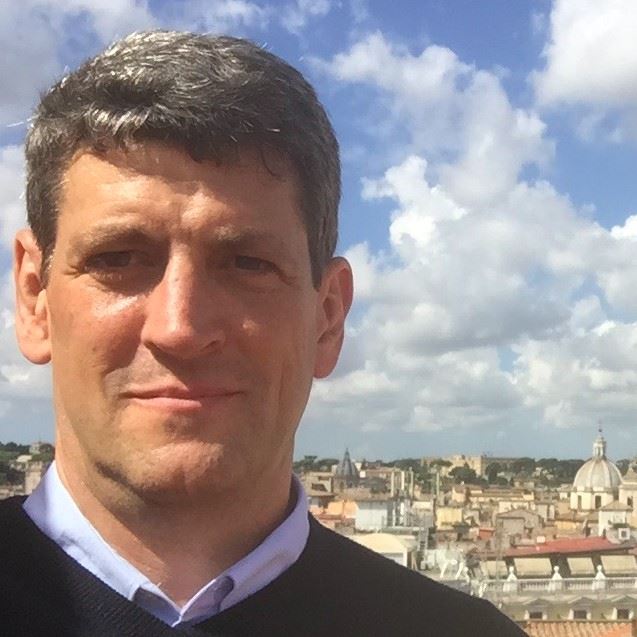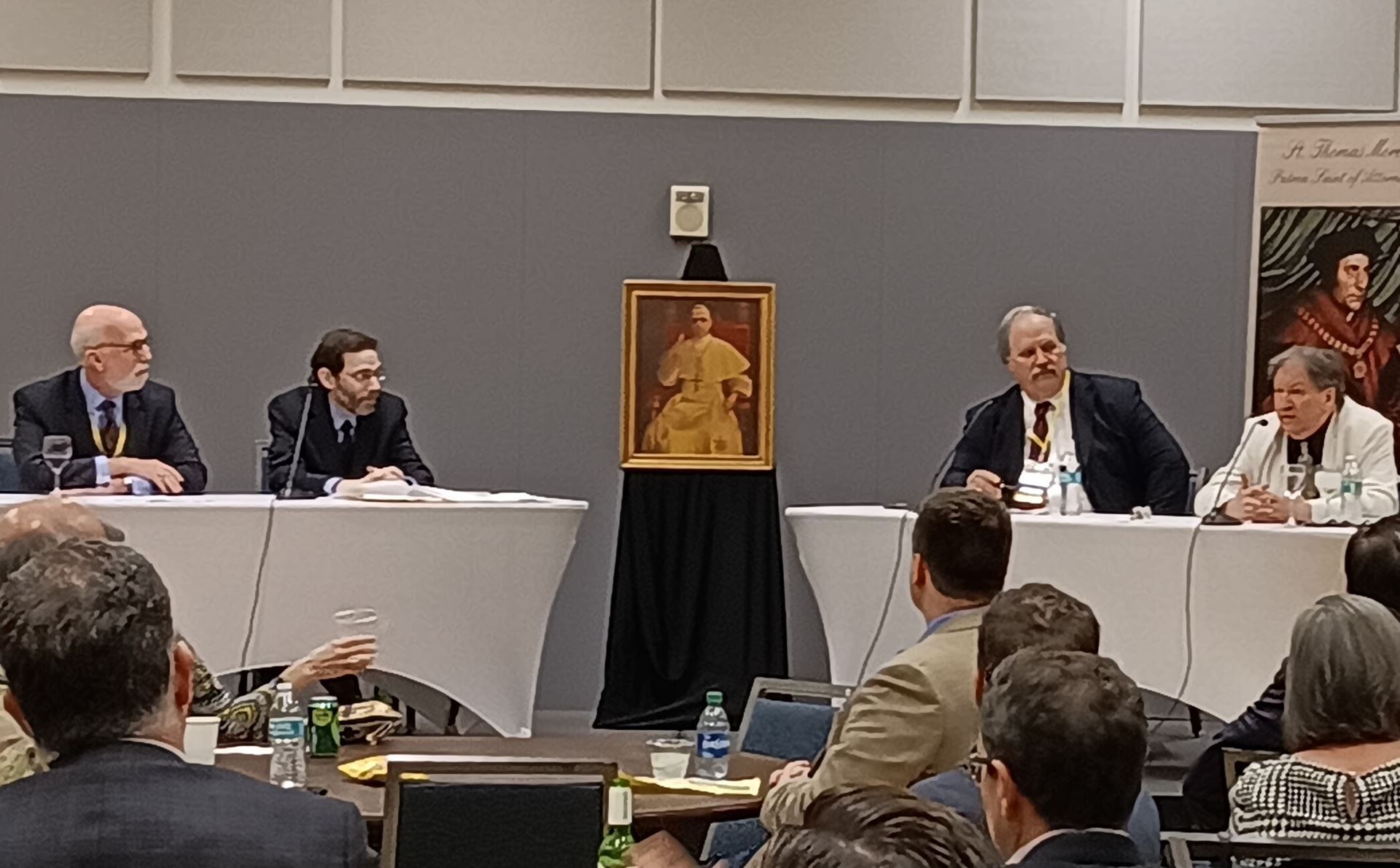Thank you to our awesome speakers, engaged participants, volunteers, directors, and chaplain for making the 2023 conference truly amazing! Recordings of some speakers are available on our Member website. Saint John Paul II wrote “Whenever men or women heed the call of truth, their conscience then guides their actions reliably towards good. Precisely because of the witness which he bore, even at the price of his life, to the primacy of truth over power, Saint Thomas More is venerated as an imperishable example of moral integrity. And even outside the Church, particularly among those with responsibility for the destinies of peoples, he is acknowledged as a source of inspiration for a political system which has as its supreme goal the service of the human person." Apostolic Letter Issued Motu Proprio Proclaiming Saint Thomas More Patron Of Statesmen And Politicians, October 31, 2000. |
Conference Report |
Bishop, Diocese of Arlington | The Most Reverend Michael F. Burbidge (St. John Fisher Speaker), Bishop of the Diocese of Arlington, was the principal celebrant and homilist of the beautiful and inspiring Red Mass at the Basilica of St. Mary in Alexandria that marked the official end of the Conference. In his homily, Bishop Burbidge reminded the attorneys in attendance of their special duty to give witness to the Faith by pursuing their vocations in a manner that comports with its teachings and which protects the most vulnerable members of society. |
Chief Judge, U.S. Court of Appeals, Eleventh Circuit
| Judge William H. Pryor (St. Thomas More Lecture), Chief Circuit Judge of the United States Court of Appeals for the Eleventh Circuit delivered his address at the banquet following the Red Mass. Himself raised in Mobile and now based in Birmingham, Alabama, Judge Pryor presented a riveting case study of the murder of a Catholic priest in Birmingham, Alabama 102 years ago. Quoting extensively from trial testimony, Judge Pryor painted a vivid picture of the racial, ethnic, and religious prejudice that beset the nation at that time and how it affected the trial of E.R. Stephenson, who was accused of murdering Fr. James Edwin Coyle in retaliation for Fr. Coyle’s having performed a secret wedding ceremony between Stephenson’s daughter and Pedro Gussman, a native of Puerto Rico. Critiquing the work of the defense attorney, who would go on to be an eminent jurist, indeed an Associate Justice of the United States Supreme Court, Judge Pryor examined the type of unethical and abusive tactics that, even in the zealous defense of one’s client, must be avoided by any person of conscience and especially by Catholic members of the bar. |
Antonin Scalia Law School George Mason University | Professor Helen M. Alvaré (Charles E. Rice Memorial Lecture) , one of the foremost intellectual architects of the Dobbs decision, argued eloquently that Catholic sexual morality is best understood as living out the law of love and the parable of the Good Samaritan within the family and that the defense of Catholic principles in the public square should better reflect this reality. |
Mark L. Rienzi, President of the Becket Fund for Religious Liberty, conveyed an uncommonly optimistic message concerning the defense of Religious Liberty in the American judicial system and civil society. Citing a streak of nearly 20 court victories in a row, he attributed these victories to the perseverance of the litigants and to a growing recognition, even by the irreligious, that government actions that burden the Free Exercise of Religion must either withstand strict scrutiny or not be undertaken at all. |
Judge Robert J. Conrad, Jr., a federal district judge in North Carolina and author of John Fisher and Thomas More: Keeping Their Souls While Losing Their Heads, told the tale of the first great martyrs of the English Reformation and the habits of mind and spirit that formed them. While Judge Conrad shared many anecdotes from the lives of these great men, his summary of the habits that formed them was perhaps the most striking: constant prayer; pursuit of excellence in their professions; intentionality in their vocations; respect for human dignity, even in the worst of circumstances and the worst of men; and merriment borne of detachment from the world and acceptance of the will of God. |
Mattias A. Caro, President of the Saint Thomas More Guild of the Catholic Diocese of Arlington, explored the challenges, and rewards of composing and adhering to an authentically Catholic Advanced Medical Directive through the lens of his experience with the sudden decline and death of his beloved father-in-law. |
| Michael Mazza, a canon and civil lawyer, used a hypothetical, but realistic, case study to examine the predicament of a priest who is accused of misconduct during the period when a review board is investigating his case and determining whether there are valid grounds for initiating a canonical proceeding against him. Drawing from his academic research, Mr. Mazza argued persuasively for pursuing the investigation process in a manner that protects, at once, the truth, the legitimate rights of victims, the presumption of innocence, and the reputation of the priest, to the extent it is amenable to protection. |
| Joseph Bottum, William Doino, Jr., and Ron Rychlak, conducted a roundtable discussion entitled “The Tale that Won’t Stop Wagging: The Attacks on Pius XII and What They Tell Us.” The panelists initially outlined a cyclical pattern, dating back to 1963, of denunciation of Pius XII’s supposed role in the Holocaust based on purportedly “new information,” learned defense of his authentic role in saving the lives of many hundreds of thousands of Jews and other oppressed persons, and a period of quiescence , followed by repetition of the cycle. A lively discussion, including not merely the panelists, ensued on the reasons underlying this phenomenon. |
University of Notre Dame Law School | Professor Nicole Stelle Garnett, a professor at the University of Notre Dame Law School and a foremost advocate of school choice, conducted a lively tour of American religious history, precedents that distorted Religious Liberty in the educational context, and recent victories in the school choice arena, including the recent Supreme Court decision in Carson v. Makin. Professor Garnett traced the phenomenal progress of the school choice movement from a few isolated experiments 25 years ago to at least10 states with universal school choice programs today (not to mention the numerous states that have more limited school choice options). |
Heather A. Lachenauer, General Counsel of the University of Dallas analyzed the tension between compliance with the many statutes and regulations that govern the operation of a modern university and the higher obligation of educating students in accordance Ex corde Ecclesiae, Pope Saint John Paul II’s 1990 apostolic constitution regarding Catholic institutions of higher learning |
Erika Bachiochi, a Fellow at the Ethics in Public Policy Center, expounded on the historical record left by the early feminists to argue for an approach to women’s rights that is rooted in the natural law, that considers the separate and unique natures of men and women, and which addresses the correlative rights, duties, and obligations of men, women, and families. |
Judge, U.S. Court of Appeals, District of Columbia Circuit | Judge Justin R. Walker, who serves on the United States Court of Appeals for the D.C. Circuit, traced the Free Exercise and Establishment Clauses to the birth of the American Republic, to the Founders’ belief that religion is an intrinsically important aspect of American life, and to their desire to protect religion from government interference. Judge Walker outlined later lines of cases that purported to prevent the entanglement of government and religion but which at times seemed instead to protect government and the public square from religion. Finally, he examined recent jurisprudence and legislation that, in his view, marks a shift toward a position that better respects the role of religion in the lives of the citizenry and therefore in American life. Perhaps most bracing to a roomful of Catholic lawyers was his reminder that for us, living the Faith must be a way of life and not a mere political program. |
President Emeritus and Co-Founder of the Acton Institute | Rev. Robert A. Sirico, president emeritus and co-founder of the Acton Institute, spoke in his capacity as an ardent advocate for the Catholic Church in China. Using the case of Catholic activist and entrepreneur Jimmy Lai and the documentary film The Hong Konger as the centerpiece of his remarks, Father Sirico scrutinized the many limitations the Chinese government places on the free and open exercise of the Catholic Faith, and all faiths for that matter. Based on this examination, he demonstrated that the Chinese Communist Party’s fundamental goal is to greatly diminish, if not eliminate, “foreign” influences, such as that of the Catholic Church, on Chinese society. |
Co-sponsored by the Saint Thomas More Guild for Legal Professionals in the Catholic Diocese of Arlington, Virginia |
Continuing Legal Education (CLE) |
We are pleased to report that, for the 2023 CBA Conference, at least 9.0 CLE credit hours were pre-approved in 17 states and could be self-reported in 7 other states:
|
Photo Gallery |


